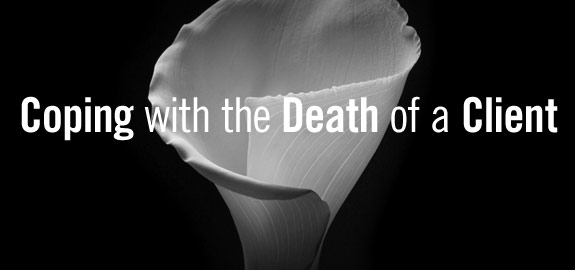The death of a client can create a flurry of emotions for the providers with whom they form close bonds. Bobbi Jo Evans, a housing specialist at Harbor Health Services, Inc. in Branford, Connecticut, describes the difficult experience of losing a client.

I first met “Stan” (not his real name) shortly after I became the housing specialist at Harbor Health Services, Inc. He lived under the railroad bridge and had a history of alcohol use. Stan received a housing voucher available to consumers experiencing homelessness with low or no income. When we met, he had approximately $400 coming in each month from State assistance and food stamps.
The process of housing Stan took over 3 months. He was very easygoing and felt that he did not deserve the opportunity presented to him. Our agency worked with him to provide medical care, treatment for substance use, and assistance with his application for Social Security benefits.
I was able to locate a one-bedroom condominium that was perfect for Stan. It had natural wood finishes that appealed to his love of nature. It was on the first floor, with no stairs to bother his back and leg issues. The laundry facilities were right outside his kitchen door.
Stan moved in with minimal furniture. We gave him a bed, some small tables, and a television. He obtained Social Security Disability Insurance 3 months later. He was able to furnish his apartment, but never treated himself to anything new. He liked the rustic feel of used furniture. He also enjoyed being able to provide money to his family, although years before they abandoned him.
Over the course of 2 years, I worked with Stan to assist him with the yearly re-certification process, inspections, and any minor household dilemmas. Every conversation with Stan ended with him thanking me. He never admitted he deserved the opportunity, but his gratefulness was evident.
Stan never did stop drinking. He went through phases when the alcohol was the most important thing in his life, and phases when he did not want to see a drink again. I received numerous calls to come to various locations where he fell down drunk and would only let me help him through the situation. We formed an odd bond that I never fully understood.
I spoke to Stan for the last time 2 months ago. He told me about his plans to take some trips to the country this year to do the hiking and fishing that he so enjoyed. I asked if he would mount anything that he caught. He jokingly told me that anything he caught would go right on a plate. He then told me about meeting an old friend, and said that both old and new friends were the best friends a person could have.
We discovered, 2 days later, that he went to the hospital that evening and passed away from a massive coronary. I was distraught upon hearing the news of his death. I recalled searching for Stan under the bridge or stopping in the middle of a busy street to get him into my car—holding him up as he fell over drunk. I also recalled the smile on his face as he invited me into his home, showed me his living room, and had a cup of tea while we discussed the color of the curtains he should get for his bathroom.
The death of a consumer can create a flurry of emotions. You always wonder what more you could have done, or done differently. You can second-guess all your actions and inactions. You feel that you have to explain to co-workers why you are upset.
My friend said it best when I told her how I felt after Stan’s death, “Just remember in your journey to help people how much one person can touch and change a life. One person at a time, we do make a difference and will continue to do so.”
